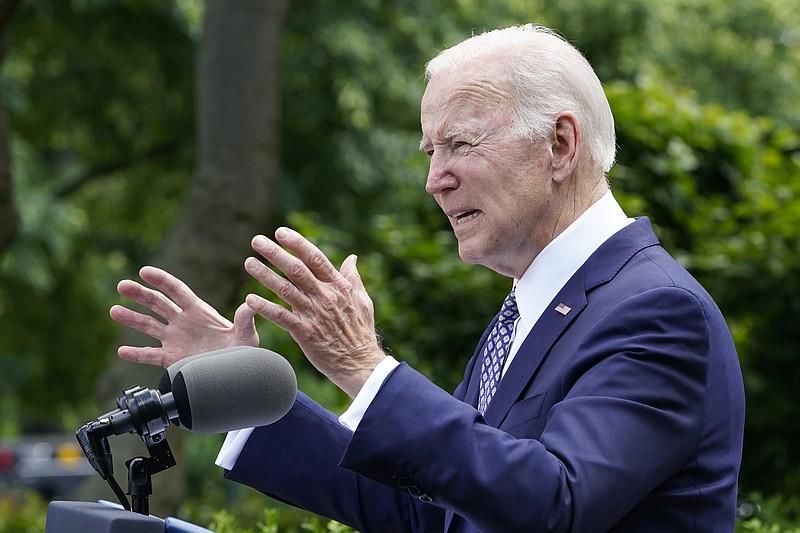WASHINGTON (AP) -- President Joe Biden embarked Thursday on a six-day trip to South Korea and Japan aiming to build rapport with the two nations' leaders while also sending an unmistakable message to China: Russia's faltering invasion of Ukraine should give Beijing pause about its own saber- rattling in the Pacific.
Biden's visit will include meetings with newly elected South Korean President Yoon Suk Yeol and Japanese Prime Minister Fumio Kishida. Their talks will touch on trade, increasing resilience in the global supply chain, growing concerns about North Korea's nuclear program and the explosive spread of COVID-19 in that country.
While in Japan, Biden will also meet with fellow leaders of the Indo-Pacific strategic alliance known as the Quad, a group that includes Australia, India and Japan.
The U.S. under Biden has forged a united front with democratic allies that has combined their economic heft to make Russia pay a price for its invasion of Ukraine. That alliance includes South Korea and Japan. However, even as Biden is to be feted by Yoon at a state dinner and hold intimate conversations with Kishida, the U.S. president knows those relationships need to be deepened if they're to serve as a counterweight to China's ambitions.
White House national security adviser Jake Sullivan said the trip would "show in living color the United States can at once lead the free world in responding to Russia's war in Ukraine, and that at the same time chart a course for effective, principled American leadership and engagement in a region that will define much of the future of the 21st century."
The war in eastern Europe has created a sense of urgency about China among major U.S. allies in the Pacific. Many have come to see the moment as their own existential crisis -- one in which it's critical to show China it should not try to seize contested territory through military action.
In a reminder of how Biden has tried to balance security issues in each hemisphere, shortly before leaving for Asia he hosted Prime Minister Magdalena Andersson of Sweden and President Sauli Niinistö of Finland at the White House to show support for their applications to join NATO.
"America's alliances in Europe and in Asia keep us -- and I would argue the world -- strong and secure," Biden said in the Rose Garden. "They're how we confront the challenges of our time, and deliver for our people today, and harness opportunities for a better tomorrow."
Biden's overseas travel comes as he faces strong domestic headwinds: an infant formula shortage, budget-busting inflation, a rising number of COVID-19 infections, and increasing impatience among a Democratic base bracing for a U.S. Supreme Court ruling that is likely to result in a roll back of abortion rights.
The conundrums Biden faces in Asia are no less daunting.
China's military assertiveness has grown over the course of Biden's presidency, with its provocative actions frequently putting the region on edge.
Last month, China held military drills around Taiwan after a group of U.S. lawmakers arrived for talks on the self-governed island. Late last year, China stepped up sorties into Taiwan's air space. Taiwan considers itself a sovereign state, but Beijing views Taiwan as a breakaway province and has not ruled out the use of force to achieve unification.
Japan has reported frequent intrusions by China's military vessels into Japanese territorial waters around the Senkaku Islands in the East China Sea. The uninhabited islets are controlled by Japan but claimed by China, which calls them Diaoyu.
Chinese Foreign Minister Wang Yi on Wednesday criticized what he called negative moves by Washington and Tokyo against Beijing during a video call with Japanese Foreign Minister Yoshimasa Hayashi.
"What arouses attention and vigilance is the fact that, even before the American leader has set out for the meeting, the so-called joint Japan-U.S. anti-China rhetoric is already kicking up dust," Wang said, according to China's Foreign Ministry.
Meanwhile, South Korea could tilt closer to the U.S. under Yoon, who took office last week. The new South Korean president has criticized his predecessor as "subservient" to China by seeking to balance the relationships with Washington and Beijing. To neutralize North Korea's nuclear threats, Yoon has pledged to seek a stronger U.S. security commitment.
The Biden administration has warned China against assisting Russia in its war with Ukraine. In March, the U.S. informed Asian and European allies that American intelligence determined China had signaled to Russia a willingness to provide military support and financial backing to reduce the blow of severe sanctions imposed by the U.S. and its allies.
Biden administration officials said the Russian invasion has been a clarifying moment for some of the bigger powers in Asia as financial sanctions and export bans have been put in place to check Russia.
U.S. Ambassador Rahm Emanuel, Biden's top envoy to Japan, said the Japanese have stood out by rallying eight of 10 members of Association of Southeast Nations to back a U.N. vote against the Russian invasion.
"Japan has been a pacesetter that has picked up and set the pace for South Korea, Singapore, Australia, New Zealand and others here in the Indo Pacific area," Emanuel said of Tokyo's support of Ukraine following the Russian invasion.

